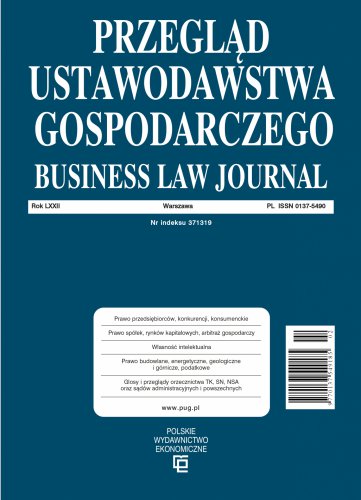Trade-related environmental measures in the global climate protection regime
The aim of this article is to analyze the potential impact of international climate law on the trade liberalization. Flexibility mechanisms introduced by the Kyoto protocol and Paris agreement result in the creation of trade-related environmental measures. Those measures are created by the states in their national policies aiming at implementation of flexibility mechanisms into national legal orders. Trade-related environmental measures are not directly identified by the WTO law. This creates a situation where such measures may be challenged in the WTO dispute resolution system. Article shows potential threats and tries to underline axiological common ground between climate change law and WTO law, which enable wider acceptance of the use of trade-related environmental measures between the WTO members.
References
Bibliografia/References
APEC (1999). Survey on Trade-Related Environmental Measures and Environmental-Related Trade Measures. Singapore: APEC.
Bartels, L. (2012). The WTO Legality of the Application of the EU's Emission Trading System to Aviation. European Journal of International Law vol. 32 no. 2 429–467. https://doi.org/10.1093/ejil/chs017
Bhagwati, J., Mavroidis, P. (2007). Is action against US exports for failure to sign Kyoto Protocol WTO-Legal? World Trade Review, 6(2), 299–310. https://doi.org/10.1017/s1474745607003291
Ciechanowicz-McLean, J. (2004). Międzynarodowe Prawo Ochrony Środowiska. Warszawa: Polskie Wydawnictwo Naukowe.
Ciechanowicz-McLean, J. (2016). Prawo ochrony klimatu. Warszawa: Powszechne Wydawnictwo Prawnicze.
Ciechanowicz-McLean, J., Nyka, M. (2009). Multilateralism as a way of obtaining compliance in national environmental policies with international economic law. Gdańskie Studia Prawnicze, 22, 47–62.
Ciechanowicz-McLean, J., Nyka, M. (2010). Rola międzynarodowych instytucji finansowych w ochronie środowiska, In: A. Dobaczewska, E. Juchniewicz, T. Sowiński (eds.), Finanse publiczne. Warszawa: CeDeWu.
Condon, M., Ignaciuk, A. (2013). Border Carbon Adjustment and International Trade: A Literature Review. OECD Trade and Environment Working Papers 2013/06. https://doi.org/10.1787/5k3xn25b386c-en
Deane, F. (2015). Emissions Trading and WTO Law. A Global Analysis. Northampton: Edward Elgar.
Espa, I., Marin Durán, G. (2018). Renewable Energy Subsidies and WTO Law: Time to Rethink the Case for Reform Beyond Canada — Renewable Energy/FIT Program. Journal of International Economic Law, 21, 621–653. https://doi.org/10.1093/jiel/jgy031
Espa, I., Rolland, S. (2015). Subsidies, Clean Energy, and Climate Change. Geneva: ICTSD.
Gehring, M., Cordonier Segger, M. C. (2005). Sustainable Development in World Trade Law. Hague: Kluwer Law International.
Gralczyk, A., Gralczyk, A. (2011). Wprowadzanie mechanizmów rynkowych w ochronie środowiska. Warszawa: Polskie Wydawnictwo Ekonomiczne.
Hawkins, S. (2016). Carbon Market Clubs under the Paris Climate Regime: Climate and Trade Policy Considerations. ICTSD Policy Brief, October.
Howse, R., Eliason, A. (2009). Carbon Trading and the CDM in WTO Law. In: R. Stewart, B. Kingsbury, B. Rydyk (eds), Climate Finance: Regulatory and Funding Strategies for Climate Change and Global Development, 254–258. New York: New York University Press. https://doi.org/10.1017/cbo9780511757396.005
Howse, R., Eliason, A. (2009). Domestic and international strategies to address climate change: an overview of the WTO legal issues. In: T. Cottier, O. Nartova, S. Bigdeli (eds), International Trade Regulation and the Mitigation of Climate Change. World Trade Forum, 48–94. Cambridge: Cambridge University Press.
Hrytzak, D. (2002). The Impact of Trade-related Environmental Measures on International Trade 4. The Saskatchewan Economics Journal, 15, 15–25.
Kenig-Witkowska, M. M. (2011). Międzynarodowe prawo środowiska. Wybrane zagadnienia systemowe. Warszawa: Wolters Kluwer Polska.
Kenig-Witkowska, M. M. (2016). Porozumienie Paryskie w sprawie zmian klimatu — refleksje ze stanowiska prawa międzynarodowego. In: B. Krzan (ed.), Ubi Ius Ibi Remedium. Księga dedykowana pamięci Profesora Jana Kolasy, 229–238. Warszawa: C.H. Beck.
La Hoz Theuer, S., Schneider, L., Broekhoff, D. (2019). When less is more: limits to international transfers under Article 6 of the Paris Agreement. Climate Policy, 19(4), 401–413. https://doi.org/10.1080/14693062.2018.1540341
Małecki, J. (1982). Prawno-finansowe instrumenty ochrony i kształtowania środowiska. Poznań: Uniwersytet Adama Mickiewicza.
Marceau, G. (2001). Conflicts of Norms and Conflicts of Jurisdictions, The Relationship between the WTO Agreement and MEAs and other Treaties. Journal of World Trade, 35(6), 1081–1131.
Monuro, J. (2014). Trade in Carbon Units as a Financial Service under International Trade Law: Recent Developments, Future Challenges. Carbon and Climate Law Review, 8(2), 106–114.
Nyka, M. (2016). Trade-related instruments of promotion of human right to the environment in international climate law. In: S. Kosiciarova (ed.), Právo na životné prostredie a nastroje jeho presadzovania, 176–188. Trnava: Trnavska Univerzita.
Nyka, M. (2018). Instrumenty ograniczania wpływu handlu na środowisko. Studium z prawa międzynarodowego. Warszawa: Difin.
Pauwelyn, J. (2013). Carbon Leakage Measures and Border Tax Adjustments under WTO Law. In: D. Prévost, G. Van Calster (eds), Research Handbook on Environment, Health and the WTO, 448–506. Northampton: Edvard Elgar. https://doi.org/10.4337/9781781006146.00024
Rosenzweig, R. (2016). Global Climate Change Policy and Carbon Markets: Transition to a New Era. Washington: Palgrave Macmillan.
Schneider, L., La Hoz Theuer, S. (2019). Environmental integrity of international carbon market mechanisms under the Paris Agreement. Climate Policy, 19(3), 386–400. https://doi.org/10.1080/14693062.2018.1521332
Singh, N. (2009). Trade-related Measures in Multilateral Environmental Agreements and WTO: Irreconcilable Differences? American Journal of Economics and Business Administration, 1(3), 251–256. https://doi.org/10.3844/ajebasp.2009.251.256
Stiglitz, J. (2006). A New Agenda for Global Warming. Economists' Voice, 3(7), 3.
Tietenberg, T. (2006). Emissions Trading: Principles and Practice. 2nd edition. Washington: Resources for the Future.
UNEP (2007). Trade-related Measures and Multilateral Environmental Agreements. Nairobi: UNEP.
Voigt, C. (2009). Sustainable Development as a Principle of International Law. Resolving Conflicts between Climate Measures and WTO Law. Dordrecht: Martinus Nijhoff. https://doi.org/10.1163/ej.9789004166974.i-428
Vranes, E. (2009). Trade and the Environment. Fundamental Issues in International Law, WTO Law, and Legal Theory. Oxford: Oxford University Press. https://doi.org/10.1017/s147474560999022x
Watson, J. (2013). The WTO and the Environment. Development of competence beyond trade. London/New York: Routledge.
Wilder, M. (2005). Implementing the Clean Development Mechanism and Emissions Trading beyond Europe, 231–262. In: F. Yamin (ed.), Climate Change and Carbon Markets. Earthscan.
Woederman, E. (2004). The Institutional Economics of Market-Based Climate Policy. Amsterdam: Elsevier.
Wold C., Gaines S., Block G. (2011). Trade and the Environment. Law and Policy. Durham: Carolina Academic Press.

